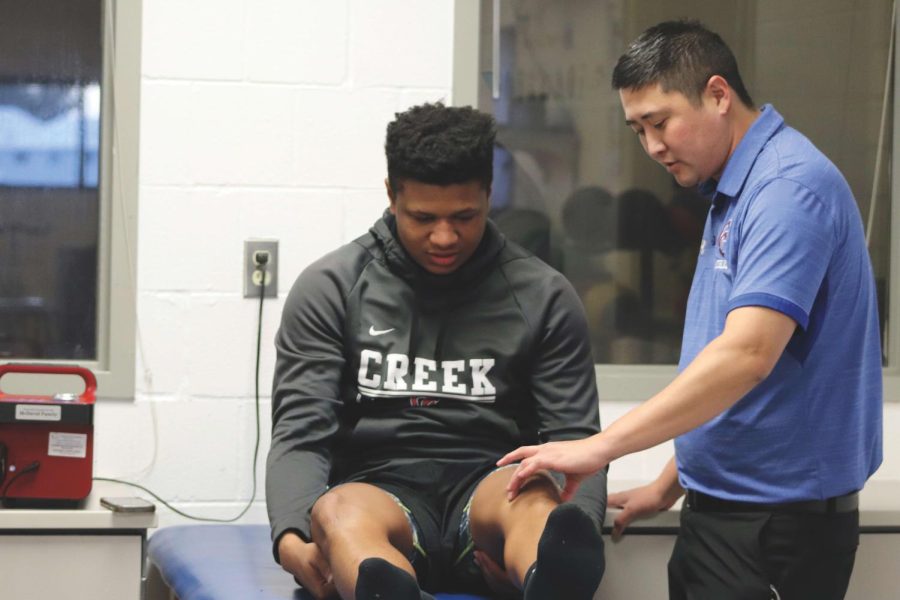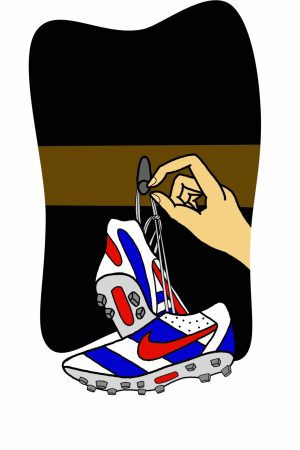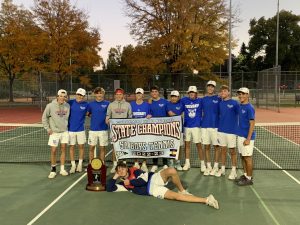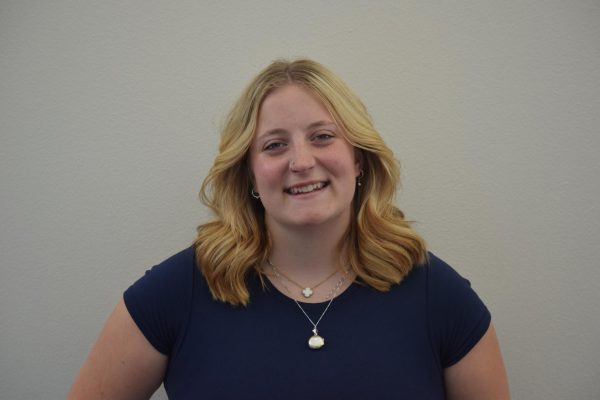Creek Athletic Trainer Shares His Passion
Athletic Trainer Josh Yamaguchi works on junior Kaden Bennett’s knee. “He’s very respectful and helpful,“ Bennett said.
December 16, 2022
On the sidelines of every Creek game. Between every practice. During broken ankles and concussion protocol, there is always one constant: athletic trainer Josh Yamaguchi.
Yamaguchi snagged the job at Creek four years ago, and despite the glamorous appeal of working with professional teams, Yamaguchi was drawn towards the flexibility working in a school could provide. “I’ve heard other stories from other athletic trainers that it is very time consuming. Their hours are very rigorous, especially in season,” he said.
But Yamaguchi wanted a life outside of work. “Knowing that I wanted to have a family, I didn’t want to be in a position where I had to sacrifice my family for my job. This is a good balance between having family time and being at work,” he said.
This balance wasn’t always the case. “When you’re a young athletic trainer, the jobs are relatively low paying and can have long hours. They can be a lot of hard work. Whether it be the high school, college, or professional level the toughest part is just getting started,” Yamaguchi said.
Yamaguchi’s training style focuses primarily on the rehabilitation of injury. Junior Kaden Bennett is a frequent of the training office, and has felt the strategy Yamaguchi employs. “He’s good at prioritizing people and takes his time making sure people are good to go for games,” Bennett said over text interview.
More nuanced is his emphasis on the value of comfortability. “We’re also, to a lesser extent, a place for kids to relax a little more. They’re not in a classroom where they have to be tense and stressed. We’re a place where they can hopefully recover well,” he said.
Comfort is seen everywhere in the athletic training room. Windows are scattered throughout, bringing in light, and making what would be an brick room open. Inside the office itself is a wall splattered with the signatures of some of Creek’s most distinguished athletes. Even the stool inside the office is cushioned.
Despite Creek’s athletic prowess, it is still a public school. That lack of privatization, more notably the funds that go with it, limits what Yamaguchi can provide for rehabilitation. “If money weren’t an issue, the use of highly skilled strength and conditioning coaches would be something that would benefit [athletes.]” Yamaguchi said. “ I think when we talk about injury prevention, that [strength and conditioning] is a really big part of it.”
Yamaguchi appreciates the trust he has with coaching staffs, especially their understanding of his process.
“There’s very little black and white in athletic training; it’s not a test you can score 100% on. It’s not graded,” he said. “Yes, we try to do the best we can with each person, but we never talk about being perfect.”
The “we” Yamaguchi mentions is his co-trainer Cristina Navarro.
The pair work on roughly 1,000 athletes every fall. “We don’t get the opportunity to be really, really involved and follow up constantly. But that’s just a byproduct of the environment.” Yamaguchi said.
Yamaguchi’s involvement is enough to be emotionally invested during games. “Because we know these athletes so well, we have a personal connection to a lot of them. We want to see them win and we want to see them succeed,” he said. “But at the same time, I try to keep the mentality that I don’t have any impact on the game. If they lose it’s nothing I can control.”
Yamaguchi wants his athletes to thrive. But, for him, it starts with his own passion.
“If you’re passionate about [athletic training], if you care about it, then you’ll put the time and energy and effort in. When you care about something, it blossoms and becomes something you envision.”























